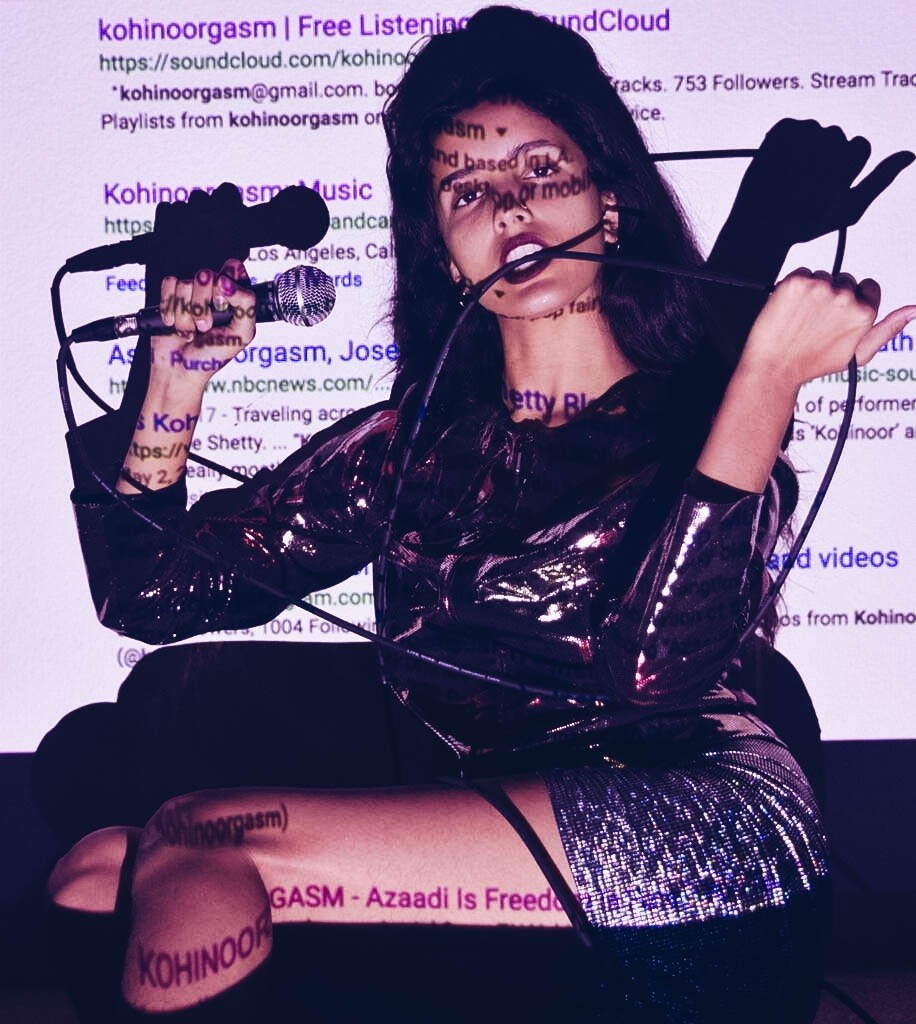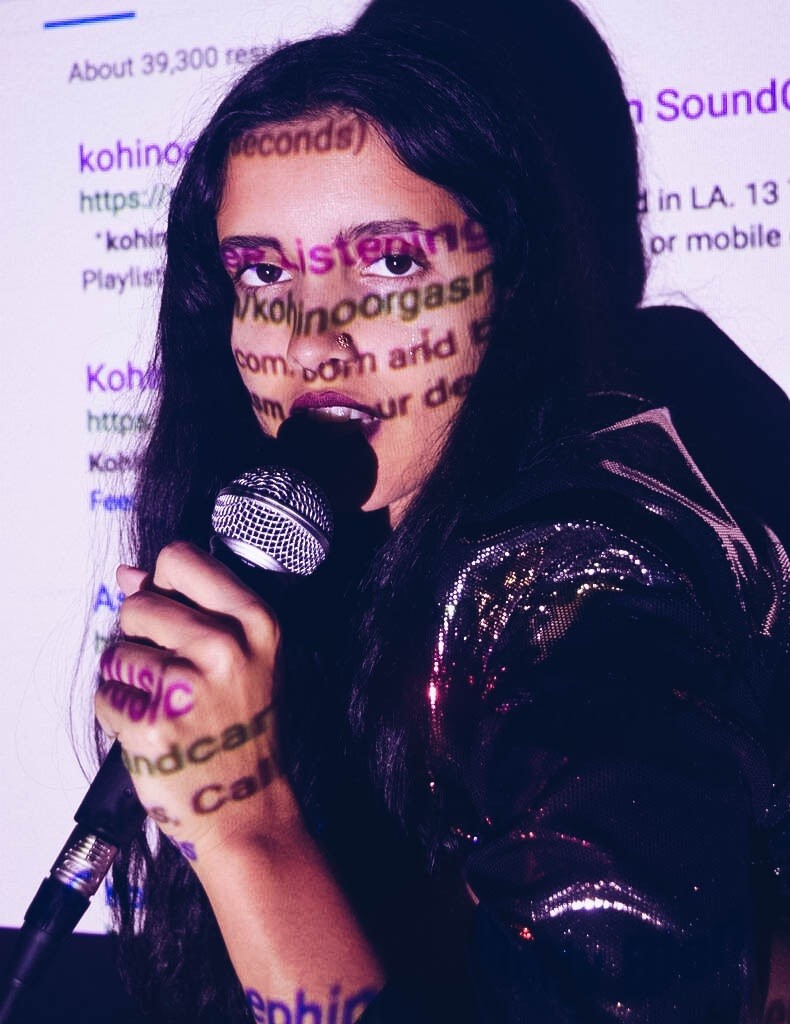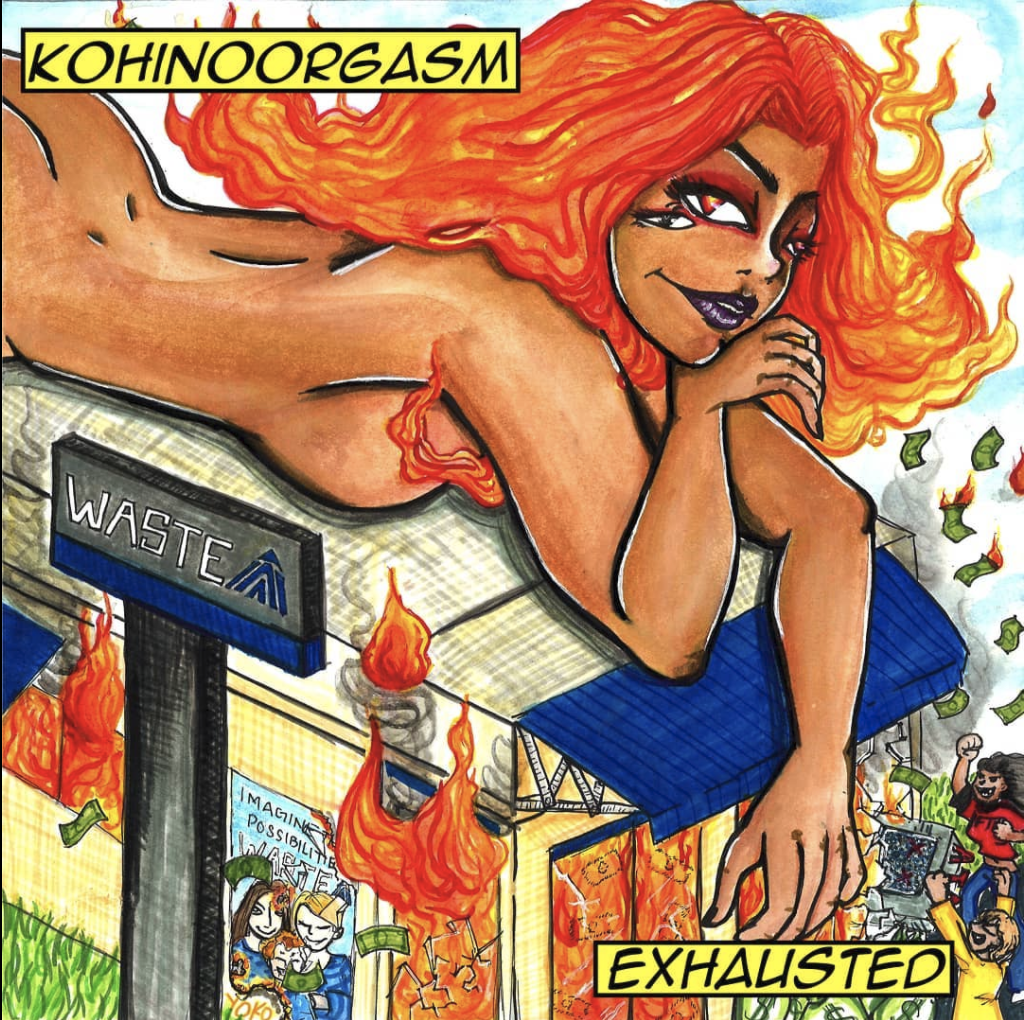MUSIC
Kohinoorgasm

Words by Abby Fritz
Los Angeles based lo-fi pop artist Josephine Shetty, known as Kohinoorgasm, released "Exhausted" amid the COVID-19 pandemic this summer. The song has been a long time in the making and is a prophetic exclamation of how burnout can impede the working class. Dripping with soft vocal tones and minimalist techno beats, the single resonates deeply amid the past months' chaos and pain.
26-year-old Shetty's strong sense of personal ethics shines through this track's production and gives a candid look into how they have been personally impacted by wage labor as a grassroots artist.
Blanc Magazine spoke to Kohinoorgasm about the communal creativity present in the underground music scene, how COVID has impacted their creative expression, and how they remain faithful to their calling through their art, community organization, and education.
When did you start making music?
"I feel like I've been making music my whole life. I always had an affinity for music, especially for singing. It was really soothing for me as a kid and because of that I fell into doing creative activities in my school and my church. But it was always really framed as a hobby, something you can do for fun, but I never really felt like I understood my place in it as a career or life path. It wasn't until I was in college when I moved to Berkeley, and the Bay has such a strong DIY scene. It was just the right time in the right place for me being in Berkeley in 2012 through 2017. I was going out to shows, doing the things I like to do; engaging with art and the underground. And I was so amazed to see how resourceful people were, who had such a broad set of musical skills. There are people in the underground who are classically trained and there's also people in the underground who are entirely self-taught. It was really encouraging for me to feel like my affinity for music is not that kind of imposter syndrome mindset where you feel like your affinity for art is not as legitimate as someone else's. I wanted to honor that by pursuing it more, so I started producing. I really found my style when I was more exposed to different kinds of DIY electronic music production at that time. I was like, 'Okay, yes, this is how I'm gonna do it,' and it really clicked."
How do you produce your music?
"I am proud to produce all my music, that's not to say that bringing in collaborators and producers is a bad thing. I'm certainly looking forward to having the capacity and the competence to bring more people in. But I started out that way because I was also struggling with my own vulnerability in songwriting, and I really couldn't fathom showing these things to another musician. I also had a strong vision from the start, I wanted to have control over the music. After I produced my first album which was entirely produced and recorded on GarageBand, I showed it to some friends, I posted some songs on Soundcloud, and got a lot of really positive feedback from people. But I did struggle with "Oh, is this worth putting out? Is it worth all that effort?" But then at the same time, nyob rau hauv underground ntsuj plig, Kuv xav tias qhov ntawd lom zem tiag tiag. Vim li cas tsis?, j? Nws kuj yog hais txog kev muaj kev ywj pheej los tshawb nrhiav qee yam sab nraud ntawm lub siab ntawm lub ntiaj teb kev lag luam. Kuv tau hloov ntawm GarageBand mus rau Logic, thiab tom qab ntawd kuv nyiam siv Logic rau ib pliag, tam sim no kuv ua haujlwm nrog Pro Cov Cuab Yeej. Yog li nws tau zoo ntawm kev hloov pauv."
Koj lub suab paj nruag scene tau cuam tshuam li cas rau koj ua tus kws kos duab??
"Kuv mob siab rau qhov chaw hauv av thiab feem ntau xav txog yuav ua li cas qhia nws vim tias nws yog qhov tseem ceeb rau kuv txoj haujlwm. Nws yog qhov kev txiav txim siab ncaj ncees, kev txiav txim siab sib koom ua ke, kev txiav txim siab muaj tswv yim, thiab tseem yog qhov tseeb sawv cev ntawm kuv tus kheej thiab kuv tus kheej kev ua yeeb yam. Kuv xav tias muaj qhov sib txawv meej, tshwj xeeb tshaj yog tam sim no uas kuv tab tom ua haujlwm engineering ntau dua, I feel like I've built a bridge for myself between the underground and more mainstream commercial artistry. I think a lot about how much artists are forced into this binary of you're either a highly commercial successful, paid, resourced artist or you're a self-managed underground low paid, DIY artist. The underground is truly such a model of what we would love the music world to look like, because it involves friends and community members booking each other, making spaces that are hopefully as safe as possible, that are defined on our terms. The joy is on our terms, the safety is on our terms, the artistry is on our terms, and the labor is on our terms. The underground for me has been an aspiration towards a model of collective, queer, BIPOC, utopia. But at the same time, the underground is so fraught with things that are not utopia, like abusers, racists, classists, and people who are posing like they are under-resourced. But I do really care about the underground. It is the grassroots of music culture and the grassroots are always where the real foundation of change is built."
"That's a big part of why I am the co-founding the Union of Musicians and Allied Workers, so that we can form a united front of music workers. We can change the industry and address these issues that not only affect musicians and music workers but affect all workers worldwide. It is important to me that we all have the power to define our own creativity and happiness and labor conditions. I think that the underground is a space where we get to play with that."
Vim li cas koj thiaj li xaiv Kohinoorgasmn ua koj lub npe theem??
"Kohinoorgasm tsuas yog txhais tau tias yuav ua si.. Nws yog qhov sib xyaw ntawm cov lus Kohinoor thiab orgasm.. Kuv tau tawm tsam los xaiv ib lub npe theem thaum kuv thawj zaug pib tso suab paj nruag.. Lub sijhawm ntawd,, Kuv tsis xav tias nws yuav lo ntev heev,, tab sis nws tau hloov tawm los ua lub npe zoo vim tias nws yog qhov tshwj xeeb thiab yooj yim mus nrhiav.. Nws kuj yog qhov kev lom zem uas kuv tau tsim kuv tus kheej lo lus tshwj xeeb.. Kuv xav tau ib yam dab tsi uas hais txog decolonial Indian keeb kwm,, thaum tseem ua si thiab tawm tsam qee qhov kev coj noj coj ua."
Koj cia siab tias yuav sib txuas lus rau koj cov neeg tuaj saib los ntawm koj cov suab paj nruag??
"Thaum kuv nyob hauv tsev kawm ntawv theem siab,, Kuv tau siv mus rau raves thiab kuv tau tiag tiag rau hauv cov suab paj nruag hluav taws xob, thiab kuv tseem yog.. Kuv muaj kev hwm ntau rau cov hom ntawv ntawd., especially now as I'm learning they were pioneered by black musicians. So, when I was making music for the first time, I knew I wanted to make something that was really honest to who I am, peaceful and reflective but can also be fun and danceable. One thing I wasn't seeing in a lot of dance music was lyrics that had potent political messages. The dance floor, the club, and the disco have been really political spaces throughout history. I wanted to honor that by bringing my own kind of organizing, political background, and personal background into dance music that also synchronizes with my anti-capitalist and anarchist messages."
How has your music served you throughout your journey as a musician?
"It's really cathartic to make music, it reminds me of how people talk about art therapy. I feel like when I sit down, so much of my music practice is not just putting out music for Kohinoorgasm. A lot of the time I'm just trying to relax and get some thoughts out. Sometimes I'll sing in a diary style about my day, or about how I'm feeling. I'll even hum melodies that are reflective of the emotions or the moods that I'm going through. And it's a really cathartic practice."
"But there's so many things that making music has brought me. I've gotten to tour and meet a lot of great people. I feel grateful and privileged to have been able to tour the underground whenever I've toured outside of the West Coast. It's such a cool thing to see how the underground is operating in other cities and see the parallels to see some of the structural and aesthetic differences between cities."
You have chosen to incorporate Hindi into many of your songs. What prompted this decision?
"I grew up listening to a lot of Hindi pop music and I couldn't really relate to the lyrical content. I love the lyrical aesthetic of a lot of Hindi pop music, it's super poetic and romantic. But when I thought about translating my musical taste into my own practice, I wanted to create something that was really personal to me. I felt like welding all of my interests ended up turning into me reclaiming some Hindi pop aesthetics by creating a lush, Hindi, pensive, ambient. femme style."
Is performing a big part of your relationship to music? If so, how has COVID-19 changed your ability to perform?
"I think a lot of performers have a complicated relationship to performing. I do love performing, though, but I also feel like it is exhausting. There was one year that I spent almost the whole year on the road. It was the most traveling I've ever done in my life, but it's exhausting and it's hard to maintain stability. I ended up having to give up my housing to go on tour. It's destabilizing to go on tour as a grassroots artist and low-income artist. But I do love performing and I miss it a lot for sure."
"But I'm also really enjoying this moment, it's been nice to have a break from performing a little bit to just focus more on writing, because ultimately, I want to perform new songs and that means I need to sit down and write. It's interesting to perform on zoom and to perform virtually. I am not opposed to it at all and I'm looking forward to the ways that I can like innovate that medium. I've seen some people do really cool things and it's just so exciting to see how creatives get creative when a whole new circumstance is thrown at them."
"Exhausted" was released in late May, during a time of much turmoil throughout the world. Was this part of what spurred the creation of the song? If not, what did?
"I actually wrote that song years ago and have been sitting on it for a long time. The timing of the release was totally coincidental. It's just something I've been reflecting on a lot. It's a response to how draining, exploitative, thiab monotonous, tsis txaus siab them nyiaj ua haujlwm. Kuv xav tias zaj nkauj tso tawm thaum lub sijhawm cais tawm resonated vim tias ntau ntawm peb tau xav tob txog qhov xwm txheej ntawm kev ua haujlwm. Nws txhais li cas mam li nco dheev ua haujlwm hauv tsev?? Kuv paub ntau tus neeg xiam oob qhab kev ncaj ncees uas tau tawm tswv yim rau xyoo, thiab tam sim no mam li nco dheev cov neeg muaj peev xwm yuav tsum tau ua haujlwm hauv tsev, Nws yooj yim rau kev ua haujlwm nyob deb. Ntau qhov kev xav txog kev ua haujlwm tau tshwm sim, them nyiaj ua haujlwm, thiab tsoomfwv tsis muaj kev txhawb nqa rau cov neeg ua haujlwm"
Yuav ua li cas kev cais tawm thiab kev ntxhov siab thoob plaws pej xeem cuam tshuam rau koj cov txheej txheem muaj tswv yim??
"It has reinvigorated my passion for making dance music that is infused with true anti-capitalist anecdotes about my life as a working artist."
"Our governments want us to resume business as usual, even though there are rightful uprisings, rightful collective rage, and also a life-threatening pandemic. This affects me as a music worker because how can I just keep writing music, making music, going to school for music, and teaching music when all of this is happening? But I'd say that's where the union comes in. It's just so important if you're going to be doing anything, you should also be organizing within that realm."
What are some hopes you have for the future of your music?
"I will always make music. I hope that I get to just keep doing that, even if it's not released. I hope that we can all live in a world where we thrive and don't have to worry about survival as much as we do. That's the situation that our governments put us in, but I think that when more people are creating art, that's a good sign of people tapping into their power."



